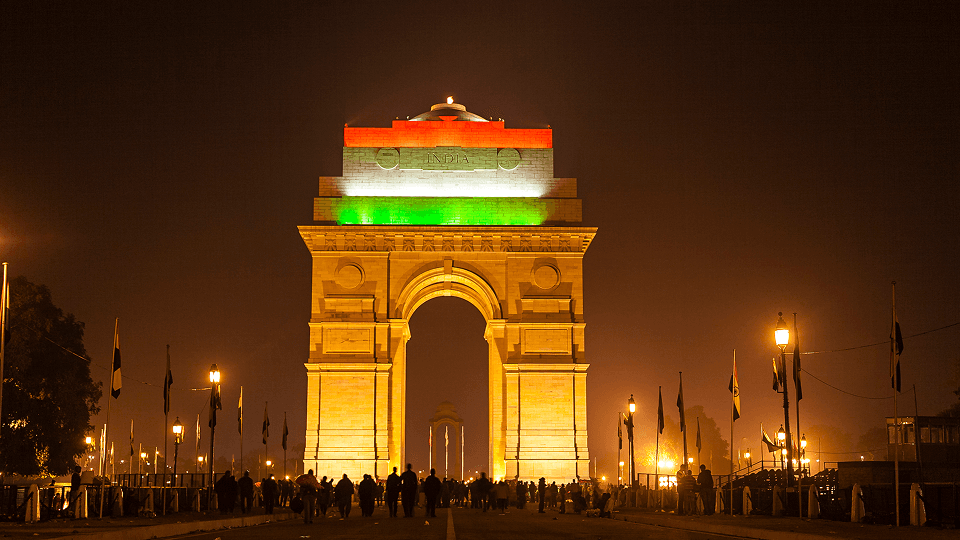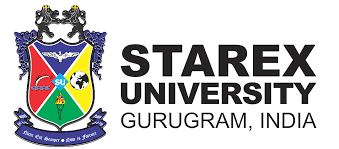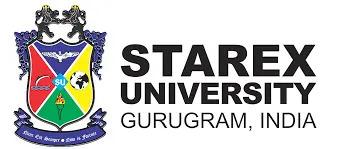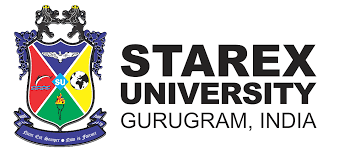India
India
Courses In India
Study in India

India, renowned for its cultural diversity and economic dynamism, is powerfully emerging as one of the world's most favoured destinations for higher education. Playing host to over 49,000 foreign students from over 160 nations (Ministry of Education, GoI, 2023), India blends academic tradition with high-tech innovation, affordability and career-orientated programmes.
With the third-largest higher education system in the world, globally accredited universities, an English-speaking academic culture and among the lowest tuition fees on the planet, India is the perfect destination for international students aiming to establish careers in sectors like hospitality, tourism, technology or business administration.
Let's examine why India is considered a global destination for higher education—especially in domains such as management, tech and hospitality and tourism.
India as a Leading Global Education Destination
Being one of the fastest-growing economies and technology, innovation and management leaders, India provides a strong education system that combines top-notch research, hands-on knowledge and prospects in emerging sectors. India is no longer just the land of the Taj Mahal or yoga retreats anymore—it's a global hub of learning. The Indian Institute of Management (IIMs), Indian Institute of Technology (IITs) and National Institute of Hotel Management (affiliated with NCHMCT) are renowned globally for academic excellence, applied learning and leadership development.
International Rankings and Figures:
- #2 in global production of STEM graduates (UNESCO Science Report, 2021)
- Top 3 in the world for numbers of higher education institutions (AISHE Report 2023, MoE India)
- 46 institutions featured in QS Asia University Rankings 2024
- #1 among top education destinations by affordability (QS Best Student Cities, 2023)
- 2nd largest higher education system in the world (UNESCO Institute for Statistics, 2022)
- India produces over 1.5 million engineering graduates annually (AISHE Report 2023, MoE India)
- Top 10 in the world for entrepreneurship education (Global University Entrepreneurial Spirit Students' Survey, 2024)
- 32.5% of Indian College Students Are Involved in Entrepreneurial Ventures (GUESSS India survey)
- India's IITs and IIMs Rank among the top institutions in Asia
India's higher education system is established on sound conceptual foundations while providing experiential learning, project-based modules and industry engagement—a combination ideally suited for courses such as hospitality, business and technology.
Leadership in Management, Technology and Innovation
India boasts some of Asia's highest-profile management and technology schools. IIM Ahmedabad, IIM Bangalore, IIT Bombay and ISB Hyderabad often rank among global MBA and technology innovation rankings. These institutions promote startup culture, entrepreneurial mindsets and cross-disciplinary research that powers India's rise as a startup and digital innovation hub.
- Ranked #3 in global research output (Scopus, 2023)
- India is the world's 3rd largest IT services exporter (NASSCOM, 2024)
- #1 worldwide in talent pool of software developers (Coursera Global Skills Report, 2023)
- India had the 3rd-largest number of unicorn companies in 2023 (Hurun Global Unicorn Index)
Institutions focus on experiential learning through incubation centres, capstone projects, internships and direct interface with international businesses—competencies highly sought after by global employers.
Affordable and Accessible Education
India offers an affordable route to quality education, with much lower tuition fees and living expenses compared to most western nations. Students can access world-class curriculums, delivered by public institutions at a fraction of the cost. International students can get scholarships through various programmes:
- ICCR Scholarships for International Students
- Study in India Programme Grants
- State-specific merit-based scholarships (e.g., Tamil Nadu and Karnataka government awards)
Relative to global averages, education in India can lower the overall cost of education by as much as 70%, without a compromise on education outcomes.
Safe and Culturally Immersive Environment
One of the world's most young and friendly populations inhabits India. With incredible support systems for social, pupil-friendly cities and lively overseas communities, India provides a comfortable setting for overseas students. Indian cities such as Bengaluru, Pune, Hyderabad and Delhi NCR feature high quality of living and student satisfaction ratings.
India is known for its active student life, particularly in cities such as Mumbai, Delhi and Bengaluru. These cities provide a mix of cultural diversity, academic quality and low cost of living, making them popular among students from South Asia and other parts of the world. The availability of many higher education institutions and an increasing number of international students further add to the student experience in India. Moreover, English is a widely spoken language and medium of instruction in most higher education institutions.
From heritage celebrations such as Diwali and Holi to yoga retreats and food diversity, international students in India can experience an immersive cultural experience along with academic development.
Multilingual, Multicultural Advantage
Indian institutions promote global citizenship through multicultural exposure, multilingual settings and a pluralistic, tolerant ethos. Students from multicultural backgrounds study together, gaining insights critical to hospitality, business and international relations.
- Over 50,000 international students currently studying in India (Study in India, 2023)
- Language courses provide Hindi, Sanskrit, Tamil, Urdu, Bengali and English—both covering ancient wisdom systems and contemporary competences
- Intercultural programmes consist of yoga immersion programmes, art residencies and UN-partnered peace-building initiatives
Global Recognition and Pathways
Indian degrees, particularly from institutions of national importance, are recognised worldwide. Indian universities have dual-degree, articulation and exchange agreements with leading institutions in the U.S., France, Germany, Australia and Japan.
- IITs and IIMs have MOUs with institutions such as MIT, Stanford, INSEAD and TU Munich
- New Education Policy 2020 permits leading foreign universities to open campuses in India and vice versa
- Indian institutions are engaged in Erasmus+, GIAN and Asia-Africa Academic Partnership frameworks
These initiatives ensure that Indian qualifications maintain cross-border mobility, academic credibility and international professional value.
Moreover, Indian private universities, such as Ashoka University, OP Jindal Global University, Amity University, Starex University, Shiv Nadar University and Manipal Academy of Higher Education, have taken deliberate steps to internationalise their campuses, offering world-class infrastructure, diverse student bodies, international faculty and safe, well-managed residential facilities that rival those in the West.
India’s Higher Education System

Imagine learning business models in the world's fastest expanding economy, trekking through tourism from Kerala's backwaters to Rajasthan's palaces or developing AI solutions in the very cities that are leading global technology innovation. This is not the future—it's the present-day India.
With more than 1,000 universities and 45,000+ colleges, India's higher education system is not only one of the biggest—it's one of the most resilient, industry-relevant and globally dynamic. Whether you're studying hospitality, information technology or management, India provides globally applicable education woven into a rich socio-cultural fabric and fueled by practical application.
Varied Institution Types
India’s education ecosystem supports multiple academic pathways through varied institution types:
- Central and State Universities:
These public universities offer a wide range of programmes in business administration, tourism, hotel management, and computer science. Most of them are UGC-approved and globally recognised.
- Institutes of National Importance (INIs):
Universities like the Indian Institute of Technology (IITs) and Indian Institute of Management (IIMs) are ranked globally for their excellence in engineering, technology and business studies. They are famous for advanced research and high employability rates.
- Private and Deemed Universities:
Contemporary private universities and deemed universities are gaining strength for their industry-focused programmes, global partnerships and emphasis on areas such as hospitality management, digitalisation, AI and sustainable tourism.
- Specialised Institutions:
India also has top-tier institutions that specialise in particular subjects—such as hotel management, culinary arts, fashion, tourism, finance and entrepreneurship—and provide globally applicable niche degrees.
Organised Degrees with Global Compatibility
India's higher education is being transformed under the National Education Policy (NEP) 2020, with global alignment and flexible learning paths.
- Bachelor's Degrees: 3–4 years (with exit routes after every year for certificate, diploma and general degrees)
- Master's Degrees: 1–2 years (after a four-year undergraduate course)
- Doctoral Degrees (PhD): 3–6 years with a focus on applied and interdisciplinary research
Most institutions today operate credit-based systems (CBCS), semester systems and international standards, facilitating greater mobility for students who may seek further education overseas.
Top Indian Universities for International Students

India provides education on par with the rest of the world at a lower cost, hence a destination of choice for foreign students from Asia, Africa, Europe and the Middle East.
1. Indian Institute of Management Ahmedabad (IIM-A):
IIM A has been continuously ranked as one of the best management institutes in the world, providing MBA, executive education and Ph.D. programmes.
2. Indian Institute of Technology Bombay (IIT-B):
IIT Bombay is another institute of international repute for engineering, technology and data sciences with robust international research collaborations.
3. Starex University, Gurugram:
Strategically located near India’s hospitality and corporate hub, Starex University offers industry-aligned programmes in Hotel Management, Technology and Business Administration. With strong academic support and access to real-world internships, it prepares students for dynamic global careers.
4. National Institute of Tourism and Hospitality Management (NITHM), Hyderabad:
Government-approved school with special programmes in tourism policy, event management and sustainable travel.
5. Christ University, Bangalore:
Provides a full spectrum of programmes in business, hospitality and computer applications, famous for academic intensity and diversity of student population.
6. Symbiosis International University, Pune:
Comprising a number of institutes that are business, hospitality and IT-orientated with high emphasis on international education.
7. Amity University, Noida:
Delivers global-standard courses in business, tourism and engineering with associations around the world.
8. SRM Institute of Science and Technology, Chennai:
Delivers courses in AI, software development, hotel management and business leadership.
9. Manipal Academy of Higher Education (MAHE):
Distinguished worldwide for excellence in hospitality, technological advancement, and healthcare education.
10. Lovely Professional University (LPU), Punjab:
Reputed for affordability, international presence and extensive course coverage, with notable international student presence.
Admission Requirements for International Students in India

India's global education reputation is increasing, courtesy of its internationally accredited degrees, cost-effective education and lively academic environment. Admission for international students is relatively simple, although universities and programmes can have different requirements. Applications are usually accepted by most institutions through their own international admissions websites or approved education partners.
Documents Required:
- Valid Passport
- Passport-Sized Recent Photograph
- Curriculum Vitae (CV)/Resume
- Academic Transcripts (high school for undergraduate, Bachelor's degree for postgraduate, Master's degree for doctoral applicants)
- English Proficiency Test is required depending on the respective university.
- Statement of Purpose (SOP) or Motivation Letter
- Letters of Recommendation (for some postgraduate and doctoral programmes)
- Visa and Proof of Financial Resources (according to Indian embassy requirements)
Academic Qualifications:
- Bachelor's Programmes:
Completion of secondary/high school education akin to India's 10+2 system, generally with international board certifications or national school-leaving qualifications.
- Master's Programmes:
A Bachelor's degree or equivalent (3 to 4 years) in the related discipline from a known university.
- Doctoral Programmes (PhD):
A Master's degree in the respective area of study, together with a proposed topic for research and sometimes an entrance interview or written examination.
Language Proficiency:
- English Proficiency Test is required depending on the respective university.
- Certain universities can waive English tests if students have studied in English-medium schools.
- Indian language proficiency is not mandatory unless for regional language or cultural studies.
Application Deadlines:
- Public Universities (State/Central):
Application windows usually open during April–June for the July–August intake, but exact dates differ across universities.
- Private Universities:
Provide flexible admission schedules, usually with several intakes throughout the year. Admission is on a rolling basis, and early application is recommended for scholarship purposes.
It is advisable to check each university's official international admissions webpage to confirm the precise criteria, deadlines, and documents required.
General Guidelines for Student Visa Procedure in India (For Foreign Students)

1. Visa Type:
International Students can apply for an Indian Student visa (S-Visa), issued to international students pursuing academic studies from a recognised institution.
2. Validity & Duration:
The student visa is normally issued for the whole course duration (up to 5 years) and can be renewed subject to the course duration and academic performance.
3. Where to Apply:
Apply at the Indian Embassy/Consulate in your home country or through India's official visa portal: https://indianvisaonline.gov.in
4. Required Documents:
- Valid passport (having a minimum validity of 6 months)
- Completed visa application form
- Passport-size photographs
- Admission letter from a valid Indian university/institution
- Proof of means of financial support (bank statements, scholarship letter, etc.)
- Proof of residence
- Receipt of payment of visa fee
- Health certificate or medical fitness (where applicable)
5. Additional Guidelines:
- Students from certain countries might need to undergo security clearance or provide biometric information.
- Visa renewal needs to be sought at the Foreigners Regional Registration Office (FRRO) in India prior to expiry.
- Students are required to register at the FRRO within 14 days of arrival in India for a stay period exceeding 180 days.
6. Processing Time:
Usually 2–4 weeks, though processing times may differ countrywise and embassy-wise.
Travel Around: Internal Travel for Foreign Students in India
India's urban centres have good, inexpensive and diversified public transport facilities like metros, buses, shared autos and local trains. Although international students do not get universal travel concessions, certain cities such as Delhi and Chennai provide public bus and metro student concession passes. Public transportation is inexpensive overall—approximately $10–$30/month, depending on the city and frequency of use. India's transport system is continuously getting better and commuting in urban areas is convenient and inexpensive for students.
Scholarships & Aid to International Students in India
India assists global students with a variety of government-sponsored and university-level scholarships, including:
- Study in India (SII) Scholarship: Waives tuition fees, accommodation and living costs for students from specific countries.
- ICCR Scholarships (Indian Council for Cultural Relations): Fully funded UG, PG and PhD for students from more than 180 countries.
- SAARC/ASEAN Scholarships: Special financial assistance for students from neighbouring countries to foster academic collaboration.
These are competitive and merit-based scholarships, which usually demand a Statement of Purpose (SOP), academic transcripts and letters of recommendation. Students may apply through embassy channels or the respective programme websites.
Internships & Part-Time Work for International Students in India
In India, international students on a student visa are generally not allowed to work part-time. However, there are exceptions:
- Course-Related Internships: Paid internships required as part of the academic programme are allowed.
- On-Campus Work: Some universities may allow on-campus part-time work, though this varies by institution.
Additionally,
- Unpaid internships that are part of an academic programme are generally allowed, with approval from the host institution.
- Post-study employment requires transitioning to a work visa, which may be facilitated through job offers from Indian or multinational companies operating in India.
It's essential to check with the specific university or embassy for the latest work restrictions and guidelines for international students.
Living in India: Cost and Experience

Comparing student living expenses between India, US, UK and Germany enables international students to make wise financial decisions. It guarantees that students can match study destinations with their finances, intentions and long-term aspirations.
Here is a comprehensive comparison of the cost of living for students in India, United States, United Kingdom and Germany.
Student Living Cost Comparison (Monthly Averages in USD):
| Expense Category | India | United States | United Kingdom | Germany |
| Accommodation | $180 – $430 | $800 – $2,500 | $800 – $1,800 | $330 – $1,300 |
| Utilities | $25 – $70 | $150 – $300 | $130 – $260 | $110 – $275 |
| Food | $35 – $130 | $200 – $500 | $250 – $500 | $160 – $380 |
| Transportation | $25 – $60 | $50 – $150 | $50 – $150 | $55 – $110 |
| Healthcare Insurance | $60 – $180 | $100 – $400 | $60 – $130 | $110 – $330 |
| Internet & Mobile | $7 – $20 | $50 – $100 | $40 – $80 | $30 – $65 |
| Entertainment | $40 – $130 | $100 – $400 | $120 – $350 | $110 – $270 |
| Tuition Fees (Annual) | $1,200 – $24,000 | $20,000 – $50,000 | $12,000 – $40,000 | $5,500 – $16,500 |
- India is by far the most affordable option for overseas students, with lower fee structures, cheaper living expenses and more budget-friendly everyday costs such as rentals, meals and transport.
- United States (US), United Kingdom (UK) and Germany have the higher costs, with rentals, meals and medical care being big-ticket items for students.
- Fees in India are significantly less than in the United States and the United Kingdom, making it a desirable choice for those interested in affordable education.
- India is still a prime choice for students who want to get the most out of their education without paying a fortune.
Career Prospects for International Students in India

- Eligibility to Work: International students are usually not eligible to work full-time but may pursue internships and course-related employment placements as part of their programme.
- After Graduation: In order to work after graduation, students can opt for an employment visa if they receive a job offer in their field.
Conclusion
Educational experience in India provides an effective combination of high-quality education, rich cultural experience and high employment prospects with a variety of opportunities, mainly in the disciplines of management, technology and engineering. Supported by a growing economy, flourishing industries and a healthy study environment, India provides a valuable platform for academic and professional advancement.
Learners from all over the world can anticipate accessing a high-quality education system combined with exposure to one of the world's fast-developing employment markets. With proper emphasis on academics and career development planning, India is a potentially bright destination for students wishing to establish a profitable future.
Blogs In India

- Mar 11, 2025
- Technology

- Mar 11, 2025
- Technology

- Mar 11, 2025
- Management

- Nov 19, 2025
- Technology

- Mar 13, 2025
- Technology

- Mar 13, 2025
- Hospitality

- Mar 17, 2025
- Technology

- Apr 4, 2025
- Hospitality

- Apr 10, 2025
- Hospitality

- Apr 7, 2025
- Technology

- Sep 18, 2025
- Management

- Apr 3, 2025
- Technology

- Oct 22, 2025
- Hospitality

- May 30, 2025
- Hospitality

- Jun 5, 2025
- Technology

- Jun 6, 2025
- Management

- Jun 10, 2025
- Hospitality

- Jul 9, 2025
- Technology

- Jul 10, 2025
- Hospitality

- Jul 10, 2025
- Hospitality

- Jul 11, 2025
- Hospitality

- Aug 21, 2025
- Technology

- Oct 1, 2025
- Technology

- Dec 17, 2025
- Management

- Dec 18, 2025
- Technology

- Dec 22, 2025
- Technology

- Dec 22, 2025
- Technology

- Dec 30, 2025
- Technology

- Jan 6, 2026
- Arts and Humanities

- Jan 12, 2026
- Hospitality

- Jan 14, 2026
- Hospitality

- Jan 15, 2026
- Management




